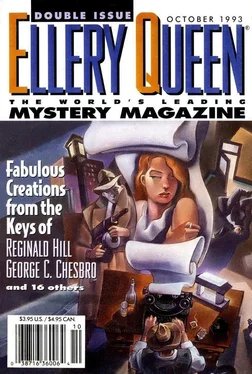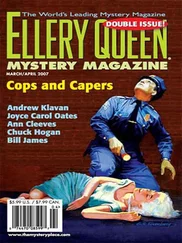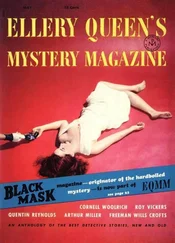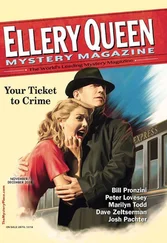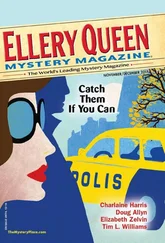Charles Ardai - Ellery Queen’s Mystery Magazine. Vol. 102, No. 4 & 5. Whole No. 618 & 619, October 1993
Здесь есть возможность читать онлайн «Charles Ardai - Ellery Queen’s Mystery Magazine. Vol. 102, No. 4 & 5. Whole No. 618 & 619, October 1993» весь текст электронной книги совершенно бесплатно (целиком полную версию без сокращений). В некоторых случаях можно слушать аудио, скачать через торрент в формате fb2 и присутствует краткое содержание. Город: New York, Год выпуска: 1993, Издательство: Davis Publications, Жанр: Детектив, на английском языке. Описание произведения, (предисловие) а так же отзывы посетителей доступны на портале библиотеки ЛибКат.
- Название:Ellery Queen’s Mystery Magazine. Vol. 102, No. 4 & 5. Whole No. 618 & 619, October 1993
- Автор:
- Издательство:Davis Publications
- Жанр:
- Год:1993
- Город:New York
- ISBN:нет данных
- Рейтинг книги:3 / 5. Голосов: 1
-
Избранное:Добавить в избранное
- Отзывы:
-
Ваша оценка:
- 60
- 1
- 2
- 3
- 4
- 5
Ellery Queen’s Mystery Magazine. Vol. 102, No. 4 & 5. Whole No. 618 & 619, October 1993: краткое содержание, описание и аннотация
Предлагаем к чтению аннотацию, описание, краткое содержание или предисловие (зависит от того, что написал сам автор книги «Ellery Queen’s Mystery Magazine. Vol. 102, No. 4 & 5. Whole No. 618 & 619, October 1993»). Если вы не нашли необходимую информацию о книге — напишите в комментариях, мы постараемся отыскать её.
Ellery Queen’s Mystery Magazine. Vol. 102, No. 4 & 5. Whole No. 618 & 619, October 1993 — читать онлайн бесплатно полную книгу (весь текст) целиком
Ниже представлен текст книги, разбитый по страницам. Система сохранения места последней прочитанной страницы, позволяет с удобством читать онлайн бесплатно книгу «Ellery Queen’s Mystery Magazine. Vol. 102, No. 4 & 5. Whole No. 618 & 619, October 1993», без необходимости каждый раз заново искать на чём Вы остановились. Поставьте закладку, и сможете в любой момент перейти на страницу, на которой закончили чтение.
Интервал:
Закладка:
“With John?”
“No. John will not be with us after today.”
John nodded brightly at this. Evidently the principal had given an ultimatum to Mrs. Burley over the telephone. I can imagine the terms of it — careful avoidance of the words abnormal, special case, impossible to measure up to the progress of other boys his age, and such. With arctic, polite finality, Madame de St. Etienne would have read John out of the human society where his years put him but where his retarded mind and disordered nerves, so clearly announced by his rough, doglike appearance, must exclude him. Gail Burley’s despair can be felt. How could she ever again pretend even to herself that her child, if only thrown into life, would make his way like anyone else? How could she love anything in the world if she could not love the son who was mismade in her womb? What a bitter affront it was to her famous good looks of face and body, her hard brightness of mind, her firm ability to govern everything else that made up her life, if she must be responsible for such a creature as John. How to face a lifetime of exasperated pity for him? How to disguise forever the humiliation which she must feel? The daily effort of disguising it would cost her all her confident beauty in the end.
“Why don’t we go home now?” I asked.
“John’s mother thinks it would look better if he simply came home like the other children when school is dismissed this afternoon.”
Yes, for if they saw him come earlier, people would say once again what she knew they were always saying about John. I knew well enough the kind of thing, from hearing my own father and mother talk kindly and sadly about my playmate.
Let him come home after school, like everyone else, and tomorrow, why, then, tomorrow, Gail Burley could simply say with a shrug and a speckled smile that she and Howard didn’t think it was really just the school for John. There was something about those teachers, neither quite nuns, nor quite ordinary women, which was unsettling. The Burleys would look around, and meantime, John could be tutored at home, as Gail herself had been one winter when she had gone as a little girl with her parents to White Sulphur Springs. Leaving the school could be made, with a little languid ingenuity, to seem like a repudiation by her, for reasons she would be too polite to elaborate upon for parents of other children still attending it.
The day passed slowly in the principal’s office. At eleven o’clock there was a fire drill, set off by a great alarm gong which banged slowly and loudly in the hall just above the office door. The door was kept closed upon us, but we could hear the rumble and slide of the classes as they took their appointed ways out of the building to the shaded playgrounds outside.
“I want to go, I want to go!” cried John at the window. “Everybody is there!”
“No,” said Madame de St. Etienne, turning like an engine in her swivel chair, “we will remain here. They will presently return.”
John began to cry.
The principal looked to me to manage him and calmly turned back to the work on her desk, placing a pince-nez upon the high bridge of her thin nose with a sweep of her arm which was forced to travel a grand arc to bypass her bosom.
But at last, when the clock in the office showed twenty-five minutes past two, she said,
“Now, John, and now, Richard, you may take your things and go home. School is dismissed at half-past two. Perhaps it would be prudent for you to leave a little before the other boys. You will go straight home.”
“Yes, Madame.”
She gave us each her hand. To John she said,
“May God bless you, my poor little one.”
Her words and her manner sent a chill down my belly.
But in a moment we were in the open air of the autumn day, where a cold wind off the lake was spinning leaves from the trees along the street. John capered happily along and when we reached the candy store, he remembered how we would stop there. I wondered if stopping there would violate our orders to go “straight home,” but the store was on the way, and we went in.
John enjoyed shopping. He put his stubby finger with its quick-bitten nail on the glass of the candy counter, pointing to first one then another confection, and every time he made up his mind he changed it, until the proprietor, an old man with a bent back in a dirty grey cardigan, sighed and looked over his shoulder at his wife, who sat in the doorway to their back room. His glance and her return of it plainly spoke of John’s idiocy.
“There!” said John finally, aiming his finger and his hunger at a candy slice of banana, cut the long way, and tasting, I knew, of cotton mixed with gun oil. The candy banana was white in the center with edges stained orange and yellow.
I moved on to the counter where you could buy the magic photographic plates which showed nothing until you exposed them to the light. I wanted to buy one, but I had no money. John came beside me and said,
“Richard, I’ll get you one.”
“Oh no.”
“Oh yes, I’ll get you two.”
He put down four pennies to pay for two prints and the storekeeper gave me the box to choose my prints. On the edge of each little plate was the name of its subject. I chose the liner Mauretania and Buckingham Palace.
“Here,” I said to John, offering him one of them. “You keep one.”
He put his hands behind his back and blew his tongue at me between his thick lips.
“All right, then, thanks, we have to go home now. Come on, John,” I said.
Eating his banana, John was compliant. We came out of the store and went to the corner where we turned into our street. Our houses were a block and a half away. We could just see them. Under the billowing trees and the cool autumn light they looked asleep. They called to me. I wanted suddenly to be home.
“Let’s run, John,” I said.
We began to run, but we got no farther than a large hedge which ran up the driveway of the second house from the comer.
It was a great house, with a large garage in back, and a deep lawn. I knew the brothers who lived there. Their name was Grandville. They were a year or two older and very self-important because of their family automobiles and their electric train system, which occupied the whole top floor of their house.
They now jumped out from behind the hedge. With them were three other boys. They had all just come home from school. While we had idled in the candy store, they had gone by to wait for us.
“John, John, the dog-faced one!” they called and took John and dragged him up the driveway toward the garage in the windy, empty neighborhood. “Crazy, lazy, John’s a daisy,” they chanted, and I ran along yelling,
“Let us go, let us go!”
“Shut up, or we’ll get you too,” cried one of the brothers.
“Richie!” moaned John, “Richie!”
The terror in his blurry voice was like that in a nightmare when you must scream and cannot make a sound. His face was belly-white and his eyes were staring at me. I was his protector. I would save him.
“Richie! Richie!”
But I could do nothing against the mob of five, but only run along calling to them to “let go of us” — for I felt just as much captive as John, whom they dragged by arms and legs. He went heavy and limp. They hauled him through the chauffeur’s door — a narrow one beside the big car doors, which were closed — and shut the door after us all. The center of the garage was empty, for the big Pierce-Arrow limousine was out, bearing Mrs. Grandville somewhere on a chauffeur-driven errand.
“Put him there!” yelled one of the brothers.
Four boys held John on the cement floor by the drain grille while the other brother went to the wall, uncoiled a hose, and turned the spigot. The hose leaped alive with a thrust of water.
Читать дальшеИнтервал:
Закладка:
Похожие книги на «Ellery Queen’s Mystery Magazine. Vol. 102, No. 4 & 5. Whole No. 618 & 619, October 1993»
Представляем Вашему вниманию похожие книги на «Ellery Queen’s Mystery Magazine. Vol. 102, No. 4 & 5. Whole No. 618 & 619, October 1993» списком для выбора. Мы отобрали схожую по названию и смыслу литературу в надежде предоставить читателям больше вариантов отыскать новые, интересные, ещё непрочитанные произведения.
Обсуждение, отзывы о книге «Ellery Queen’s Mystery Magazine. Vol. 102, No. 4 & 5. Whole No. 618 & 619, October 1993» и просто собственные мнения читателей. Оставьте ваши комментарии, напишите, что Вы думаете о произведении, его смысле или главных героях. Укажите что конкретно понравилось, а что нет, и почему Вы так считаете.
